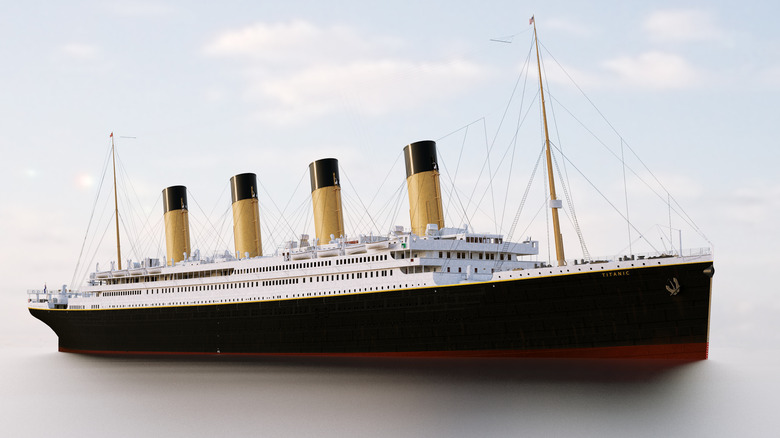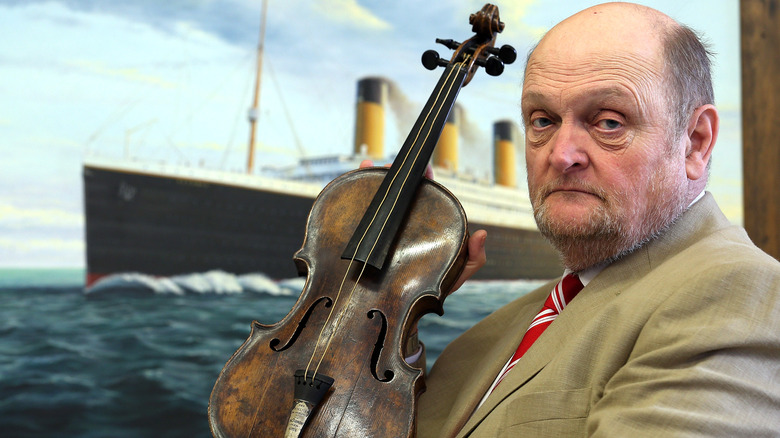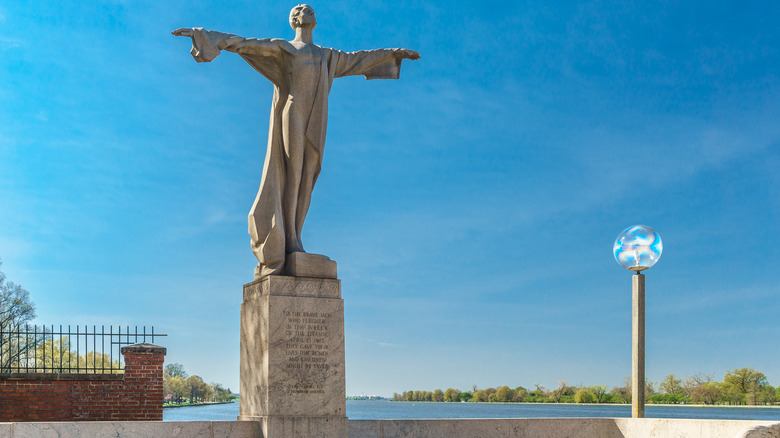The Surprising Bill Sent To The Family Of A Titanic Musician
In the wee hours of the early morning on April 15, 1912, when nearly 2,300 passengers of the Titanic should have been rocked to sleep by the ocean's lullaby under a dark, starry sky, one of the greatest tragedies in modern history struck (via History). Rather, it was the boat in question that struck an iceberg (to be precise).
Thanks to White Star Line, the British shipping company that operated the vessel, there were just 20 lifeboats, most of which were sent off half-full (or even less) of only the richest passengers (via Non-Fiction Minute). It's a tale of heartbreak and grief and the loss of nearly 1,500 people, including children (via Titanic Facts). The tragedy has become an indelible cultural touchstone, evoking singular images.
For some, it's Rose cooing that she's flying or the audience's last moments with Jack in James Cameron's 1997 Hollywood adaptation. For those who treasure history, as well as the heroes it has buried, it is an image of eight men, dedicated to doing what they do best until their very last breath — playing music.
The Heroes History Buried
Among the hundreds who perished that night, were eight brave men. Hired by White Star Line, musicians Theodore Ronald Brailey (24-year-old pianist), Roger Mari Bricoux (20-year-old cellist), John Frederick Preston Clarke (30-year-old bassist), Wallace Hartley (33-year-old bandmaster and violinist), John "Jock" Law Hume (21-year-old violinist), George Alexandre Kins (23-year-old violinist), Percy Cornelius Taylor (32-year-old cellist), and John Wesley Woodward (32-year-old cellist) did what any passionate orchestra facing the end with no escape would do — they kept playing (via Titanic Facts).
The musicians played coolly for two hours, as the Titanic sunk deeper and deeper into the Atlantic ocean's frigid depths, in an attempt to quell the overwhelming chaos, and calm their fellow passengers in the most desperate of times (via BBC).
In an interview with BBC, Music Psychologist Dr. Nikki Dibben from the University of Sheffield explained "there is research that shows music can reduce perceptions of pain ... people use music in everyday life to regulate particular moods."
According to several passengers that night, their final tune played was a Christian song titled "Nearer, My God, to Thee" which fittingly sings "Nearer, my God, to Thee, nearer to Thee! E'en though it be a cross that raiseth me; Still all my song shall be nearer, my God, to Thee," (via Euphonic Space).
It may seem eerie, to imagine a band creating a cheery soundtrack for a scene of a shipload of people facing certain death with no hope, but to many, this act is seen as selfless and brave.
Less Than a Heroes' Welcome
And while these heroes will forever be remembered, they were not originally met in their deaths with such a heroes' welcome.
In fact, their salaries effectively stopped being paid the very moment the ship started sinking around 2 a.m., and they (well, their survivors) were then charged for their uniforms, as the difference in their post-mortem earnings did not cover the brass buttons holding the shirts on their backs (via The Spectator).
Violinist John Hume's grandson, Christopher Ward, wrote in an article for The Spectator about his family's experience nearly 100 years later in 2011, to depressing detail. Hume's body was one of the only discovered, and was buried in Halifax, Nova Scotia.
According to Ward, the day the Mackay-Bennet docked (a cable ship carrying the bodies), Hume's father Andrew received a bill for 5 shillings and 4 denarius (like our pennies). Andrew refused to pay the bill, and instead forwarded it to the Amalgamated Musicians Union, which published it in their newsletter.
The treatment of said musicians and the crew eventually led 54 employees to walk off the White Star Line Olympic in protest a week later, after finding there were not enough lifeboats to accommodate everyone. They were arrested for mutiny, released, and sent back to work on the boat — which then had an additional 16 lifeboats.
Whether White Star Line learned from their carelessness seems debatable. However, their employees did, and paid for the lesson with their lives, including these eight musicians never to be forgotten.


